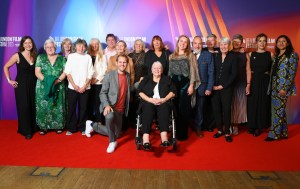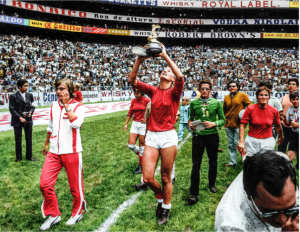The year was 1971. The venue: Azteca Stadium in Mexico City. The event: the (unofficial) Women’s World Cup soccer tournament, attracting a massive crowd of more than 110,000 madly-cheering fans – to this day, believed to be the largest gathering ever for a women’s sporting competition.
The story of this extraordinary event – and how it came to be scrubbed from history – is told in the documentary Copa 71, which screened as part of Deadline’s virtual event series For the Love of Docs. Writer-directors Rachel Ramsay and James Erskine and writer-producer Victoria Gregory joined Deadline afterwards for a conversation about their film, which has screened at film festivals around the world from Sydney, Australia to Copenhagen, London, Barcelona, Toronto, Los Angeles, Philadelphia and more.
Explaining the origins of the project, Gregory said, “That was sort of down to my husband who had heard a radio piece with one of the England team [members] and rang me and basically said, ‘This is quite an unbelievable story and if it’s not been made into a documentary, you guys should be making it.’”
Then began an effort to track down archival footage of the tournament — which featured teams from host country Mexico, England, Argentina, France, Italy, and Denmark — and finding surviving players from the squads.
“We first started talking to the England team and they were like, ‘Why now? …Why should we trust you?’” Gregory explained. “So, there was a real sense of building those relationships with them. Many of them hadn’t told their children either [about competing in the tournament], so it was a real sense of needing to build up some trust and that we were committed to telling their story and not sensationalizing it or skirting round issues as well.”
‘Copa 71’
Greenwich Entertainment
Watching the documentary, it becomes clear why many former players might feel reticent about participating in the film. The tournament was unquestionably a peak moment of their lives but at the time, in 1971, they were treated in an appalling manner by many journalists who gratuitously sexualized them and/or impugned their talent. And the soccer establishment (meaning FIFA, the sport’s male-dominated governing body) viewed the women’s tournament as a threat to their hegemony and refused to provide any support for it.
FIFA didn’t sanction an official Women’s World Cup until 1991. After the most recent tournament in 2023, won by Spain, Luis Rubiales, the then-president of the Royal Spanish Football Federation, forcibly kissed one of the Spanish women’s team members during the medal ceremony. This recent incident invites one to consider how much or how little things have evolved since Copa 71.
“We are looking at power, financial independence, physicality, a right to self-expression, the potential abuse from the media,” Ramsay says of the themes in the film. “And all of those conversations are all exactly the same — at least very, very similar — that are happening right now. I think we didn’t need to overplay that point. You put that in there, you have the conversations about pay and about the Mexican women going on strike, and then they sort of tell themselves, and I think the audience is quite quick at making those connections now and then when you do realize that this is 50 years ago and how little has changed.”

Members of the 1971 women’s England Football team including Jill Stockley, Val Cheshire, Janice Barton, Yvonne Farr, Marlene Collins, Paula Raynor, Trudy McCaffrey, Louise Cross and son of 1971 manager Harry Batt, Kieth Batt pose with producer Victoria Gregory, director Rachel Ramsay and director James Erskine at the ‘Copa 71’ screening at the BFI London Film Festival on October 8, 2023.
Joe Maher/Getty Images for BFI
Copa 71 was an enormous success with fans, proving that women’s sports indeed held the potential to appeal to a very big audience of women and men. A lot of entities – like Mexican media companies – profited off the 1971 event, although the players didn’t (as noted by Ramsay, the film explores how the Mexican team temporarily went on strike, trying to win better compensation for their athletic efforts). But this is a much bigger story than mere dollars, pesos, Euros or pounds sterling, according to Erskine.
“Money is sort of secondary when we’re talking about gender politics and when you bring up Rubiales, what’s he really doing by kissing that player? He’s sort of humiliating her… and he’s saying, ‘You are doing this at my gift,’” Erskine observed. “And I think that’s really a big theme that we really wanted to major on. The economics of sport is a whole complex thing. You can talk about age, you can talk about all the stuff with exploitation of players, but really what’s very specific about this situation is about control and saying what people can and cannot do. And that’s more fundamental than ‘Can I make a greasy dollar off the top of it?’ And I think that’s the message we want to push home is don’t tell anybody they can’t do anything.”
Added Ramsay, “It’s coming back to that idea of self-expression and the right to self-expression, whether that’s on a soccer pitch anywhere else.”
Watch the full conversation in the video above.
For the Love of Docs is a virtual Deadline event series presented by National Geographic. It continues with a new film screening each Tuesday through December 2. Next up: Black Box Diaries, directed by Shiori Itō.


